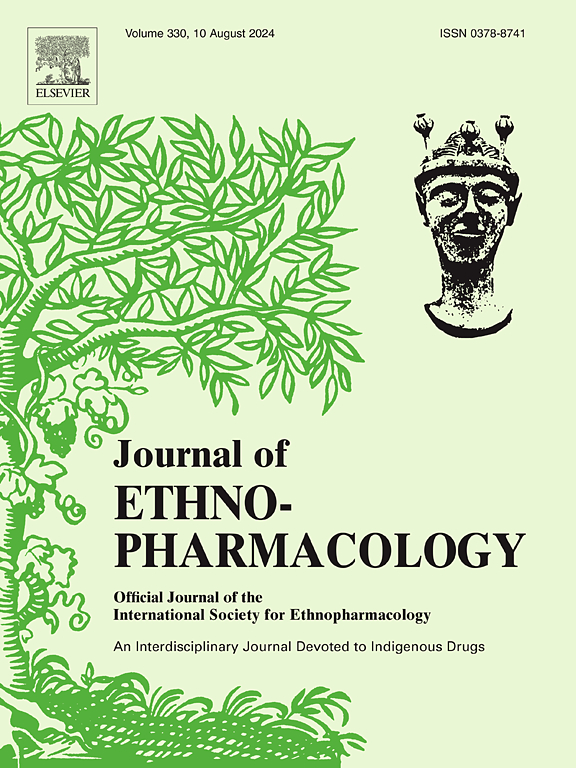Multi-omics joint analysis reveals the mechanism underlying Chinese herbal Yougui Pill in the treatment of knee osteoarthritis
IF 4.8
2区 医学
Q1 CHEMISTRY, MEDICINAL
引用次数: 0
Abstract
Ethnopharmacological relevance
Yougui Pill (YGP), originating from Jingyue Quanshu, comprises 10 traditional Chinese medicines (TCMs). This classic prescription is renowned for its ability to tonify the kidney, warm the kidney, promote yang, warm the interior, and dispel cold. YGP has proven effective in treating degenerative knee arthritis, osteoporosis, delayed fracture healing, and other orthopedic conditions, making it a widely used clinical prescription for knee osteoarthritis (KOA).
Aim of the study: Although YGP is commonly used in clinical practice, its pharmacodynamic material basis and anti-arthritis mechanisms remain unclear. This study aims to comprehensively analyze the chemical constituents of YGP and elucidate its anti-arthritis mechanisms.
Materials and methods
Ultra-high performance liquid chromatography coupled with electrospray ionization-triple quadrupole-linear ion trap mass spectrometry(ESI-Q TRAP-MS/MS) was used to identify the chemical constituents of YGP. The Hulth method was utilized to establish KOA rat model, and pathological examinations were performed to assess the anti-arthritis effects of YGP. Integrated metabolomics and transcriptomics analyses were conducted to explore the anti-arthritis mechanisms of YGP. Key targets were confirmed via immunohistochemistry.
Results
A total of 1981 chemical components were identified in YGP, predominantly phenolic acids and flavonoids. Compared with the model group, 422 differentially expressed metabolites and 214 differentially expressed genes were identified, primarily involving the MAPK signaling pathway, FoxO signaling pathway, and PI3K-Akt pathway. YGP exerted an anti-osteoarthritis effect by inhibiting the excessive activation of the EGFR/ERT/FOS signaling pathway.
Conclusions
TCM offers significant advantages in the treatment of KOA, addressing the shortcomings of current clinical medications. YGP displayed exceptional pharmacodynamic effects. This study elucidated its pharmacodynamic material basis and anti-osteoarthritis mechanisms, providing substantial support for its clinical application and the development of related drugs.

多组学关节分析揭示中药养膝丸治疗膝骨关节炎的机制
民族药理学意义:右归丸源自《景岳全书》,由 10 味中药组成。该经典处方以补肾、温肾、助阳、温里、祛寒著称。事实证明,玉屏风散对治疗退行性膝关节炎、骨质疏松症、骨折延迟愈合及其他骨科疾病有效,是临床上广泛使用的治疗膝骨关节炎(KOA)的方剂:研究目的:尽管YGP在临床上被广泛应用,但其药效物质基础和抗关节炎机制仍不明确。本研究旨在全面分析 YGP 的化学成分并阐明其抗关节炎机制:采用超高效液相色谱-电喷雾三重四极杆线性离子阱质谱法(ESI-Q TRAP-MS/MS)鉴定YGP的化学成分。利用 Hulth 法建立 KOA 大鼠模型,并进行病理检查以评估 YGP 的抗关节炎作用。通过代谢组学和转录组学的综合分析来探讨 YGP 的抗关节炎机制。通过免疫组化确认了关键靶点:结果:YGP中共鉴定出1981种化学成分,主要是酚酸类和黄酮类化合物。与模型组相比,共鉴定出 422 个差异表达代谢物和 214 个差异表达基因,主要涉及 MAPK 信号通路、FoxO 信号通路和 PI3K-Akt 通路。通过抑制表皮生长因子受体/表皮生长因子受体/FOS信号通路的过度激活,YGP发挥了抗骨关节炎的作用:结论:中药在治疗 KOA 方面具有明显优势,弥补了目前临床药物的不足。YGP显示出卓越的药效学效应。本研究阐明了其药效学物质基础和抗骨关节炎机制,为其临床应用和相关药物的开发提供了有力支持。
本文章由计算机程序翻译,如有差异,请以英文原文为准。
求助全文
约1分钟内获得全文
求助全文
来源期刊

Journal of ethnopharmacology
医学-全科医学与补充医学
CiteScore
10.30
自引率
5.60%
发文量
967
审稿时长
77 days
期刊介绍:
The Journal of Ethnopharmacology is dedicated to the exchange of information and understandings about people''s use of plants, fungi, animals, microorganisms and minerals and their biological and pharmacological effects based on the principles established through international conventions. Early people confronted with illness and disease, discovered a wealth of useful therapeutic agents in the plant and animal kingdoms. The empirical knowledge of these medicinal substances and their toxic potential was passed on by oral tradition and sometimes recorded in herbals and other texts on materia medica. Many valuable drugs of today (e.g., atropine, ephedrine, tubocurarine, digoxin, reserpine) came into use through the study of indigenous remedies. Chemists continue to use plant-derived drugs (e.g., morphine, taxol, physostigmine, quinidine, emetine) as prototypes in their attempts to develop more effective and less toxic medicinals.
 求助内容:
求助内容: 应助结果提醒方式:
应助结果提醒方式:


